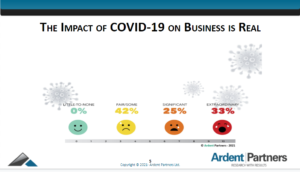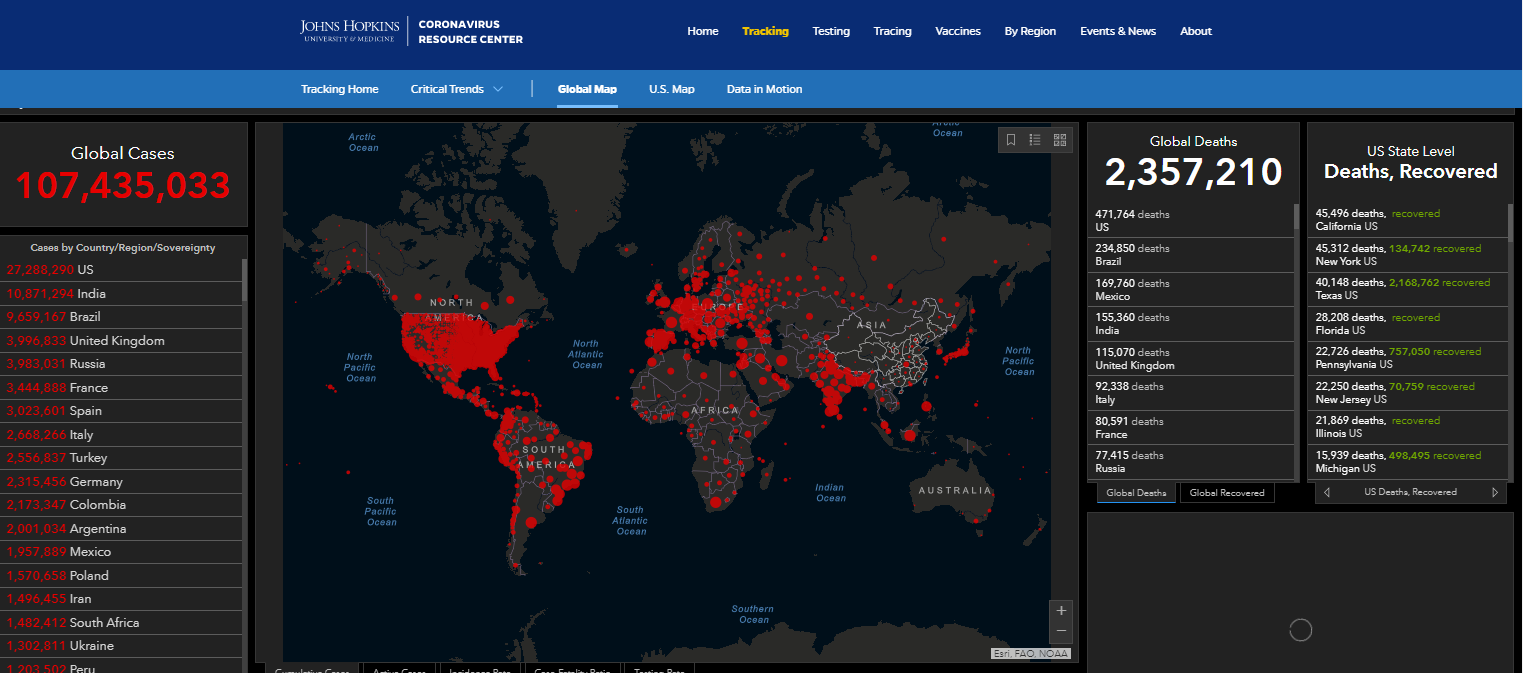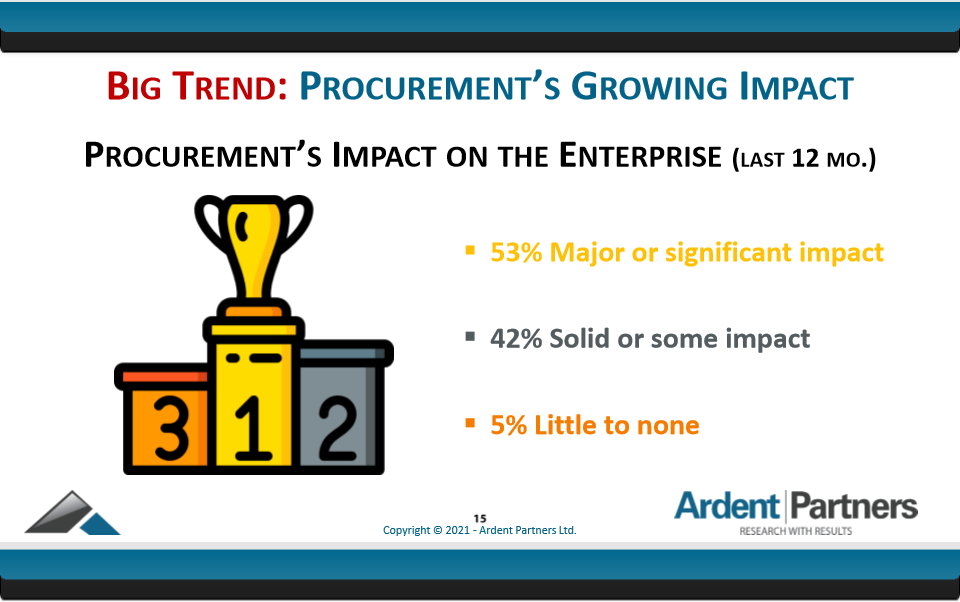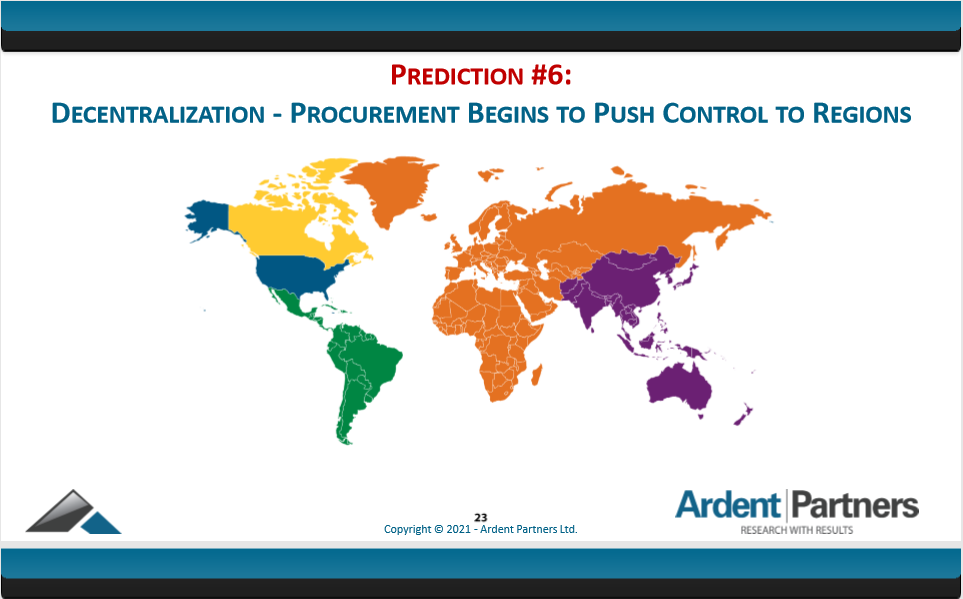Ivalua Named A Leader In The 2025 Gartner Magic Quadrant™ For Source-To-Pay Suites Report
View Report
Ivalua Named A Leader In The 2025 Gartner Magic Quadrant™ For Source-To-Pay Suites Report
View Report
Blog »

di Vishal Patel
We’re over a month into the new year and, already, we’re seeing the tables start to turn as the world begins the slow recovery from an unprecedented year of challenge and change.
But there are still plenty of obstacles to overcome. In a recent Ivalua webinar, Ardent Partners’ Chief Research Officer Andrew Bartolini presented Ardent Partners’ 8th annual Procurement Big Trends and Predictions, and shared findings and insights from the firm’s 2020 research and conversations he’s had with fellow analysts and procurement professionals.
Here is a short excerpt from the webinar. If you are short of time, watch this, otherwise keep reading!
Let’s take a look at the major trends and predictions that have emerged from the research:
According to Bartolini, Ardent Partners predicted that in 2020, global supply risk was at a 20-year high, as geopolitical uncertainty was being driven by unilateral and unpredictable trade policies established by the Trump administration. The problem was compounded by the pandemic, and beginning in March last year, CPOs and procurement leaders were really put to the test.

“The pandemic disrupted many supply chains,” Bartolini said. “In our recent survey, 70% of respondents said that the pandemic has had an extraordinary or very significant impact on their business.” But, challenges present opportunities, and procurement was resilient, he said. “Our supply chains became resilient. Our teams, companies, families and communities were all resilient, as well.”
Ardent Partners predicts that due to the imminent success of Covid-19 vaccinations, countries will gain control over the virus and slowly begin to revert to a more normal state. “While no vaccine is foolproof, it appears that the vaccines are working to inoculate most against the virus, or at least seriously reducing the symptoms and impact of Covid-19,” Bartolini noted. “And while new strains may develop, we’re on the right path. We believe that in a few months, we will be collectively in a much better position to fight against the virus, and start going back to where things were.”

Despite the vaccine’s apparent success, the impact of the pandemic will far outlast the coronavirus itself. Although more and more people across the country are being vaccinated every day, social distancing and other CDC recommendations and restrictions are still impacting how we live and work. For example, children are still distance-learning in many counties across the U.S., which has a significant impact on how businesses operate.
“Right now, the pandemic is still cutting across all aspects of our lives,” Bartolini said. “Streaming technologies have helped work continue, but the economic impact of millions of unemployed individuals is hitting home, because we are all so interconnected.”
Still, Ardent Partners predicts that the U.S. and global economies will hold steady. “We’ve seen a lot of news around the blistering-hot real estate market in the U.S., driven by record-low interest rates and easy access to credit, and we expect that to continue,” Bartolini said. “As the economy starts to open back up, that will also have a positive effect.”

The next big trend outlined in Bartolini’s presentation is Procurement’s growing business impact. According to Ardent Partners’ research, 42% of CPOs said procurement’s impact was solid or notable over the past 12 months, and 87% believe their impact has increased during the pandemic. Procurement’s increasing impact has led to a change in focus. “In the immediate aftermath of the global pandemic, there’s been a shift to prioritizing cash management and improving supply chain visibility,” he said. “We expect sourcing leaders will be reevaluating their suppliers and bringing more RFPs to market.”
As such, Ardent Partners predicts that Procurement will drive critical business strategies in 2021 and beyond, and the market for procurement professionals will heat up. “I believe that 2021 will be the best time to work in procurement from a compensation standpoint, because the skill sets of procurement professionals are in high demand,” Bortolini said.

Bartolini noted that over the past couple of years, free trade policy was altered by the previous administration, which promoted a U.S.-first agenda while negotiating Federal Trade agreements that offered no standard approach. “The US started to place tariffs on imported goods from China in an attempt to offset trade amounts between the two countries, and to punish and deter Chinese businesses and the government from engaging in intellectual property theft,” he said. “We had a shift away from NAFTA, and new agreements with Mexico and Canada were signed into law about a year ago.” In light of these events, Ardent Partners predicts that the trend will reverse, with globalization and unity leading a return to greater free trade.
“It’s important that CPOs and their teams understand which way the wind is blowing, and what legislation is likely to pass,” Bartolini said. “They need to understand what the impact will be on their supply chains and cost structures.” Being proactive rather than reactive to changing legislation is critical, he said.
Given the evolving trade legislation and other socio-economic factors impacting our access to goods and services, CPOs will need to rethink the supply chain. “There are many in the U.S. and other countries who believe that for basic security, certain goods should be manufactured domestically,” Bartolini said. “So, from a global legislative and regulatory standpoint, that’s likely to have an impact starting this year.”
Supply chains tied to China have been untested, he added, and there’s not a lot of diversification. “Now, procurement will have to diversify their supply chains, but the shift will be slow and gradual,” he said.
According to Bartolini, rather than driving for greater control as a means to diversify risk, CPOs will decentralize and push autonomy back to the regions. “The discussions I had toward the end of 2020 led me to believe that rather than driving for greater control and centralization, CPOs will start to push autonomy back to the regions as a means to diversify risk,” he said. “This is being driven from an operational standpoint — if all of a sudden one part of the world is not able to continue its operations, decentralization spreads out the operational risk.”
Working from home has changed the mindset around the value of technology for collaboration and productivity, and as such, it’s widely accepted that technology is now the linchpin for business operations. “Organizations that are controlling IT budgets now understand the value of technology for keeping people interconnected, and allowing them to collaborate and have visibility into processes and activities,” Bartolini said.
As such, Ardent Partners predicts that as organizations continue to adopt new technology, they’ll have a “suite mentality,” opting for integrated platforms rather than point solutions. “It becomes difficult when you’re using say seven different applications from seven different providers to keep them all integrated and updated over the course of a year,” Bartolini said. “Organizations don’t want to do that. They want a streamlined user experience, a single data model and the negotiable leverage of buying in bulk from solution providers. So, the technology suite mentality will become a core strategy for most organizations.”
As Bartolini noted during the webinar, the “big data” opportunity for procurement is enormous. “In the age of intelligence, nearly every aspect of an organization will be tracked and analyzed,” he said. “The challenge is to become masters of taking that data and gaining value and intelligence from it.”
Best-in-class organizations are already doing that. “They’re capturing their data, they’re developing strategies, and they’re really looking to develop their own capabilities with their staff and the technology itself,” Bartolini noted. He added that procurement technology providers are investing heavily in AI innovations that are going to enable AI to be embedded in today’s workforce management solutions. “We expect that in 2021, there will be a tipping point from a procurement context,” he said.
Following Bartoloni’s presentation, Chris Dwyer, VP of Research at Ardent Partners, picked up the discussion and explored trends and predictions about the future of work. Stay tuned for our next blog post, in which we’ll summarize those predictions. In the meantime, feel free to watch the webinar in its entirety on-demand.

Vishal has spent the last 15 years in various roles within the Procurement and Supply Chain technology market. As an industry analyst, he researched and advised organizations in various industries on best and innovative practices, digitization and optimization. He brings a thorough understanding of market trends and digital technologies that can help enterprises be more effective with their Procurement and Supply Chain strategies. He works to ensure that organizations are empowered with technology platforms that enable flexibility, innovation, and agility.
You can connect with Vishal on Linkedin